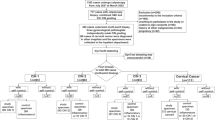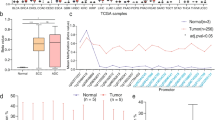Abstract
Background and objectives
Aberrant DNA methylation contributes to the malignant phenotype in virtually all types of human cancer. This study explored the relationship between promoter methylation and inactivation of the DAPK1, FHIT, MGMT, and CDKN2A genes in cervical cancer.
Methods
The promoter methylation of DAPK1, FHIT, MGMT, and CDKN2A was investigated by using a methylation-specific polymerase chain reaction in 53 specimens of cervical cancer (42 squamous cell carcinoma, 11 adenocarcinoma), 22 specimens of intraepithelial neoplasia tissues, and 24 control normal cervical tissue specimens. The correlation of promoter methylation with the clinicopathological features of cervical cancer was analyzed. The expressions of DAPK1, FHIT, MGMT, and CDKN2A were detected by measuring relative mRNA levels.
Results
The promoter methylation of DAPK1, FHIT, MGMT, and CDKN2A in cervical cancer vs. intraepithelial neoplasia vs. normal cervical tissue was 75.5 vs. 31.8 vs. 4.2 % (p < 0.0001), 66.0 vs. 59.1 vs. 25.0 % (p = 0.0033), 34.0 vs. 27.3 vs. 20.8 % (p = 0.76), and 17.0 vs. 31.8 vs. 8.3 % (p = 0.11), respectively. The methylation of the promoter region significantly decreased the expression of only DAPK1 (p = 0.03). The methylation rate of the DAPK1 gene promoter was significantly higher in cervical cancer tissues than in cervical intraepithelial neoplasia and normal cervical tissues.
Conclusion
Promoter methylation may therefore lead to the inactivation of the DAPK1 gene, and may be related to the progression of cervical oncogenesis.


Similar content being viewed by others
References
Center for Cancer Control and Information Services, National Cancer Center, Japan. http://ganjohojp/professional/statistics/statisticshtml
Walboomers JM, Jacobs MV, Manos MM et al (1999) Human papillomavirus is a necessary cause of invasive cervical cancer worldwide. J Pathol 189:12–19
Schiffman MH, Castle P (2003) Epidemiologic studies of a necessary causal risk factor: human papillomavirus infection and cervical neoplasia. J Natl Cancer Inst 95:E2
Bosch FX, Manos MM, Munoz N et al (1995) Prevalence of human papillomavirus in cervical cancer: a worldwide perspective. International biological study on cervical cancer (IBSCC) study group. J Natl Cancer Inst 87:796–802
Waggoner SE (2003) Cervical cancer. Lancet 361:2217–2225
Holowaty P, Miller AB, Rohan T et al (1999) Natural history of dysplasia of the uterine cervix. J Natl Cancer Inst 91:252–258
Jones PA, Baylin SB (2002) The fundamental role of epigenetic events in cancer. Nat Rev Genet 3:415–428
Baldwin RL, Nemet E, Tran H et al (2004) BRCA1 promoter region hypermethylation in ovarian carcinoma: a population-based study. Cancer Res 60:5329–5333
Salvesen HB, Macdonald N, Ryan A et al (2001) PTEN methylation is associated with advanced stage and microsatellite instability in endometrial carcinoma. Int J Cancer 91:22–26
Zyaman M, Saka A, Millar A et al (2002) Methylation of adenomatous polyposis coli in endometrial cancer occurs more frequently in tumors with microsatellite instability phenotype. Cancer Res 62:3663–3666
Yang HJ, Lin VWS, Wang Y et al (2004) Detection of hypermethylated genes in tumor and plasma of cervical cancer patients. Gynecol Oncol 93:435–440
Dimitrios I, Pangona O, Ioannis M et al (2009) Correlation of promoter hypermethylation in hTERT, DAPK and MGMT genes with cervical oncogenesis progression. Oncol Rep 22:199–204
Zhao XL, Meng ZY, Qiao YH et al (2008) Promoter methylation of DAPK gene in cervical carcinoma. Chin J Cancer 27(9):212–215
Dong SM, Kim HS, Rha SH et al (2001) Promoter methylation of multiple genes in carcinoma of the uterine cervix. Clin Cancer Res 7:1982–1986
Virmani AK, Muller C, Rathi A et al (2001) Aberrant methylation during cervical carcinogenesis. Clin Cancer Res 7:584–589
Narayan G, Arias-Pulido H, Koul S et al (2003) Frequent promoter methylation of CDH1, DAPK, RARB, and HIC1 genes in carcinoma of cervix uteri: its relationship to clinical outcome. Mol Cancer 2:24
Jeong DH, Youm MY, Kin YN et al (2006) Promoter methylation of p16, DAPK, CDH1, and TIMP-3 genes in cervical cancer: correlation with clinicopathologic characteristics. Int J Gynecol Cancer 16:1234–1240
Widschwendter A, Gattringer C, Ivarsson L et al (2004) Analysis of aberrant DNA methylation and human papillomavirus DNA in cervicovaginal specimens to detect invasive cervical cancer and its precursors. Clin Cancer Res 10:3396–3400
Lea JS, Coleman R, Kurien A et al (2004) Aberrant p16 methylation is a biomarker for tobacco exposure in cervical squamous cell carcinogenesis. Am J Obstet Gynecol 190:674–679
Wong YF, Chung TK, Cheung TH et al (1999) Methylation of p16INK4A in primary gynecologic malignancy. Cancer Lett 136:231–235
Widschwendter A, Muller HM, Fiegl H et al (2004) DNA methylation in serum and tumors of cervical cancer patients. Clin Cancer Res 10:565–571
Ivanova T, Vinokurova S, Petrenko A et al (2004) Frequent methylation of 5′ flanking region of TIMP-2 gene in cervical cancer. Int J Cancer 108:882–886
Widschwendter A, Ivarsson L, Blassnig A et al (2004) CDH1 and CDH13 methylation in serum is an independent prognostic marker in cervical cancer patients. Int J Cancer 109:163–166
Michie AM, McCaig AM, Nakagawa R et al (2010) Death-associated protein kinase (DAPK) and signal transduction: regulation in cancer. FEBS J 277:74–80
Ki KD, Lee SK, Tong SY et al (2008) Role of 5′-CpG island hypermethylation of the FHIT gene in cervical carcinoma. J Gynecol Oncol 19(2):117–122
Baylin SB, Herman JG, Graff JR et al (1998) Alterations in DNA methylation: a fundamental aspect of neoplasia. Adv Cancer Res 72:141–196
Jones PA, Laird PW (1999) Cancer epigenetic comes of age. Nat Genet 21:163–167
Lea JS, Coleman R, Kurien A et al (2004) Aberrant p16 methylation is a biomarker for tobacco exposure in cervical squamous cell carcinogenesis. Am J Obstet Gynecol 190:674–679
Onuki M et al (2009) Human papillomavirus infections among Japanese women: age-related prevalence and type-specific risk for cervical cancer. Cancer Sci 100(7):1312–1316
Lin Z, Gao M, Zhang X et al (2005) The hypermethylation and protein expression of p16 INK4A and DNA repair gene O6-methylguanine-DNA methyltransferase in various uterine cervical lesions. J Cancer Res Clin Oncol 131(6):364–370
Conflict of interest
The authors do not have any conflict of interests.
Author information
Authors and Affiliations
Consortia
Corresponding author
About this article
Cite this article
Banzai, C., Nishino, K., Quan, J. et al. Promoter methylation of DAPK1, FHIT, MGMT, and CDKN2A genes in cervical carcinoma. Int J Clin Oncol 19, 127–132 (2014). https://doi.org/10.1007/s10147-013-0530-0
Received:
Accepted:
Published:
Issue Date:
DOI: https://doi.org/10.1007/s10147-013-0530-0




